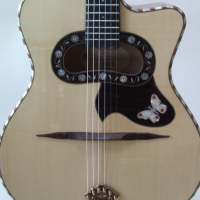DjangoBooks.com
Welcome to our Community!
Categories
- 20K All Categories
- 1.1K General
- 485 Welcome
- 59 Archtop Eddy's Corner
- 146 CD, DVD, and Concert Reviews
- 385 FAQ
- 26 Gypsy Jazz Italia
- 27 Photos
- 209 Gypsy Picking
- 21 Unaccompanied Django
- 15 Pearl Django Play-Along Vol.1
- 17 Gypsy Fire
- 45 Gypsy Rhythm
- 1.4K Gypsy Jazz University - Get Educated
- 131 Gypsy Jazz 101
- 230 Repertoire
- 227 History
- 709 Technique
- 51 Licks and Patterns
- 6 Daniel Givone Manouche Guitare Method Users Group
- 20 Eddie Lang Club
- 1.3K Gypsy Jazz Gear
- 814 Guitars, Strings, Picks, Amps, Pickups and Other Accessories
- 465 Classifieds
- 52 Recording
- 63 Other Instruments
- 18 Violin
- 5 Mandolin
- 22 Accordion
- 7 Bass
- 11 Woodwinds
- 351 Gypsy Jazz Events
- 144 North America
- 112 Europe
- 95 International
In this Discussion
Who's Online (0)
Why do Oval holes sometimes sound like Tin Cans ??
 constantine
New York✭✭✭✭ Geronimo Mateos
constantine
New York✭✭✭✭ Geronimo Mateos
Yes I know, the thin raspy sound is the trademark Django sound. I have played many o-hole guitars and find so many of them to have a very thin sound. BUT, when I hear CD's from guys like Lagrene or S. Rosenberg, the recorded sound is awesome, not thin at all. Does anyone know why? Is it their guitars, pickups? Are all of the gypsy guitars under $3000 tin can sounding?










Comments
I've always found that a guitar sounds a bit different when I play it versus hearing it played. Tone, volume, etc sounds different.
But it's not just variable wood quality of factory guitars - the mass of the 4th brace (the one under the tailpiece - Django's has none... an extreme example of lightening this brace) the size of the hole relative to the size of the body cavity (which functions as a helmholz chamber) a bridge that is the wrong mass for the top or that is poorly fit, a neck that is not sufficiently rigid or that is overdamped and basically steals selectively from the guitar's vibration... those are just the major things that can contribute to a "small" sounding guitar. The various arc radii and profile of the braces, the tuning of the soundboard (if any was done at all) the interaction of the action height of the guitar and the neck angle and the string gauge producing the right amount of tension to load the soundboard without overloading it, the method with which the pliage was achieved (stressed or bent) and what that means to all of the variables above. All of these things and more.
Why do I know this? Well, because I happen to have a small voiced guitar... the second gypsy jazz guitar I ever bought... the brand is irrelevant because there are a lot of small voiced guitars out there of many makes and every factory is bound to produce a few I suppose. It cost me a fair bit of money and the store wouldn't take it back so I started trying to fix it... which was originally the thing that got me started in luthiery. I eventually gave up trying to fix it. Someday I'll just "retop" it when I have time as its problem isn't a simple fix.
Good luck
You gain MUCH with these guitars in return for this problem with the note quality. In return you gain better ability to use vibrato in your solos and the extra bendiness gives the rest stroke technique a bit more syncopation/bounce to the picking strokes.
The gypsy rhythm and solo techniques are modeled after these guitars, especially the modern style of playing, and if using any other style of guitar the "gypsy techniques" wouldn't have nearly the same effect.
I know i am not very clear in the way I describe this, but it makes sense from my point of view, after playing this stuff for a few years.
Case in point - Stochelo Rosenberg has a distinctive tone whether he's using a Favino, Selmer or Eimers. Sure the guitars sound a bit different, but his basic distinctive tone remains the same. The tone you can get from a guitar has a lot to do with technique. I remember hearing a Favino (now owned by Michael Horowitz) played by Don Vink who is a great Dutch guitarist - the guitar sounded fine. Then Nous'che Rosenberg played a few lines on it and the guitar sounded amazing. Same guitar, different player.